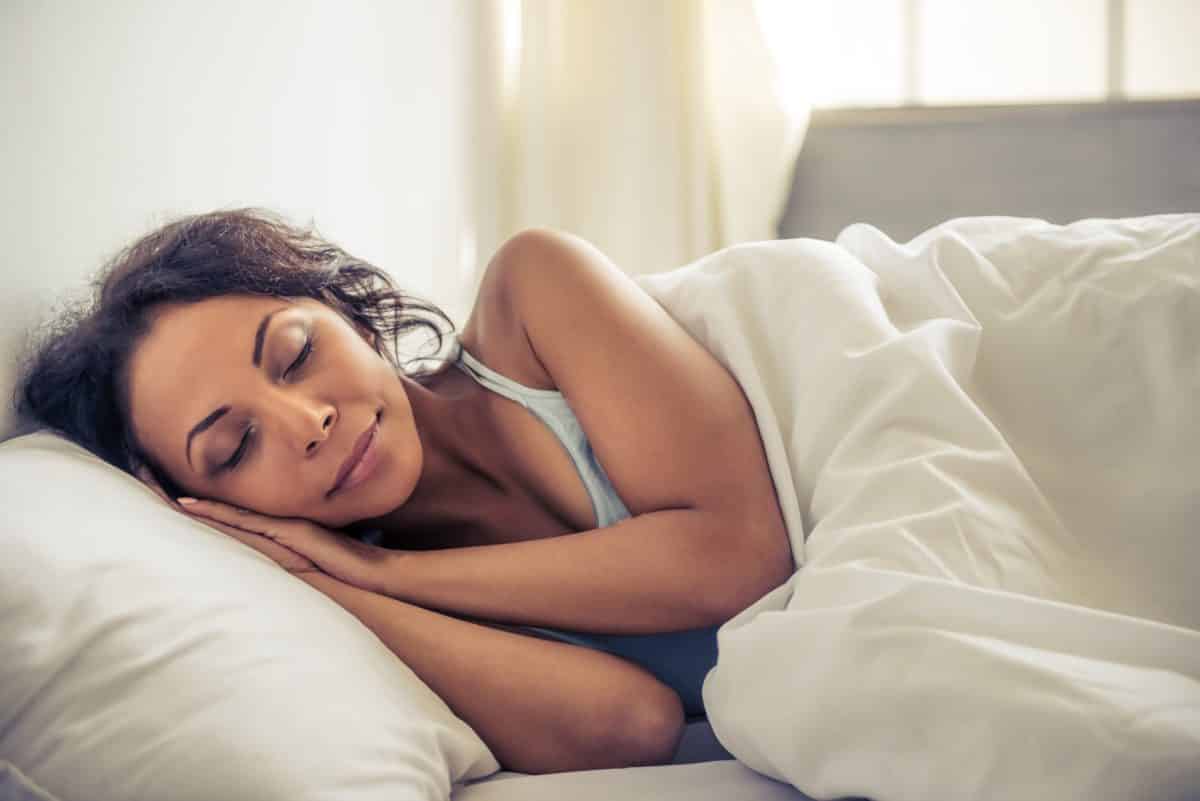Acupuncture is an ancient Chinese healing technique that has been practiced for thousands of years. It has been used to treat many conditions, including insomnia, sleep apnea and anxiety.
In this article, we’ll take a closer look at how acupuncture works, the different types of acupuncture, the benefits of acupuncture, the potential side effects and the acupuncture points that can promote better sleep.
Editor’s Note: The content provided on this site is for general informational purposes only. Any information provided is not a substitute for professional medical advice. We encourage you to consult the appropriate health expert if you have concerns.
How Does Acupuncture Work?
Acupuncture is done by inserting very thin needles into specific points on the body. Traditional Chinese medicine purports that these spots are where energy pathways called meridians are found. Acupuncture can restore the body’s natural balance and promote healing by stimulating these points.
 Monika Wisniewska/Shutterstock
Monika Wisniewska/Shutterstock
Western medicine has a different explanation for how acupuncture works. Some researchers believe acupuncture stimulates the body’s nervous system, triggering the release of natural painkillers called endorphins. Others believe acupuncture may help regulate the body’s levels of neurotransmitters, hormones and other substances that play a role in sleep and relaxation, like melatonin.
Research has also shown point specificity via MRI studies. This means that when an acupuncture point is stimulated, it affects a different, specific part of the body. Point specificity is demonstrated when the section of the brain that governs a body part becomes activated. For example, when a point on the toe is stimulated, there is brain activity in the area associated with the back. Western science still does not understand the mechanism that makes acupuncture work, yet it clearly shows that it does work.
Types of Acupuncture
During an acupuncture session, the acupuncturist may insert needles into your ear, scalp or other body parts. According to Johns Hopkins, these same points can be stimulated by other methods, including:
- Heat (moxibustion)
- Friction
- Pressure (acupressure)
- Suction (cupping)
- Electromagnetic impulses (electroacupuncture)
Does Acupuncture Hurt?
It shouldn’t. Ellen Arndorfer, a licensed acupuncturist in Viroqua, Wisconsin, says “It’s normal to feel an intense sensation or maybe discomfort when the needle is first inserted. But after the needle is in, you shouldn’t be able to feel it.” If you continue to feel discomfort, let your acupuncturist know so they can reposition the needle.
Benefits of Acupuncture
Acupuncture has been shown to offer a vast range of health benefits, including improved sleep. It can reduce stress and anxiety and may also help to regulate the body’s levels of melatonin, a hormone that plays a crucial role in sleep.
Some of the other benefits of acupuncture include:
- Pain relief
- Improved digestion
- Reduced inflammation
- Enhanced immune function
- Improved mood and mental clarity
- Hormone balancing
Acupuncture Side Effects
When appropriately performed by a licensed acupuncturist, acupuncture has few complications and can be very safe. However, severe adverse effects can happen if needles are not inserted properly or kept sterile. Possible adverse effects can include infection, nerve injury, or excessive pain. Less serious side effects can include nausea, dizziness, or fatigue.
Does Acupuncture Help You Sleep?
It certainly can. According to Tom Igneno, D.A.C.M., owner of Charm City Integrative Health in Baltimore, one of the principal ways it does this is via regulation of the autonomic nervous system. “Studies show that within 15 minutes of acupuncture treatment, the body starts to flip the switch from fight or flight to rest or digest. By entering this mode, acupuncture can help with mood, sleep, pain, digestion, and immune function.”
Acupuncture for Insomnia
If you have insomnia, there’s a good chance your health is suffering. Thankfully, acupuncture can be a handy tool to ease insomnia. Several studies have shown that acupuncture helps regulate circadian rhythms. Acupuncture can normalize serotonin levels, which then helps normalize melatonin. Additionally, acupuncture can stimulate the release of anandamide, known as the “bliss molecule .” This molecule mimics the effects of cannabis and can help people relax.
Acupuncture for Sleep Apnea
Acupuncture may treat sleep apnea by promoting relaxation and reducing inflammation in the airways. A meta-analysis of studies on acupuncture and sleep apnea showed that acupuncture could reduce the number and frequency of apnea episodes during sleep and help increase oxygen saturation.
Acupuncture for Anxiety
The busy lifestyles common in modern society have led many to suffer from chronic anxiety. The autonomic nervous system has two branches, sympathetic and parasympathetic. In a state of anxiety, the parasympathetic branch is activated. This causes a spike in cortisol, the stress hormone. Several studies have shown slightly decreased cortisol levels after several sessions of acupuncture and significant reductions in other anxiety symptoms.
Best Acupuncture Points for Sleep
Acupuncture points are named with a letter and number. The letter signifies which one of the 14 meridians the point falls on, and the number indicates which point it is along the meridian. For example, Lu14 is the fourteenth point along the lung meridian. Below are some acupuncture points that can be useful for sleep.
Acupuncture Points for Sleep Apnea
- LI20 (along the sides of the nose)
- Du16 (base of the skull)
- ST9 (side of neck)
Acupuncture Points for Insomnia
- Anmian (behind the ear)
- HT7 (wrist)
- SP6 (inner lower leg)
Acupuncture Points for Anxiety
- Yin Tang (between the eyebrows)
- PC6 (forearm)
- ST36 (outer lower leg)
Who Should Try Acupuncture?
Acupuncture may be a good option for people looking for a natural and non-invasive way to improve their sleep. It may be especially beneficial for those who have not found relief from traditional treatments or are looking to avoid medications.
The NIH lists several conditions that can be treated with acupuncture, including:
- Menstrual cramps
- Migraine
- Cancer pain
- IBS
- Urinary incontinence
- Depression
- Infertility
Who Should Avoid Acupuncture?
According to Ingegno, “There are no absolute contraindications to acupuncture.” He says, however, that folks in higher risk categories, like those with hemophilia, should discuss with their primary doctor whether acupuncture is appropriate. Pregnancy also changes which acupuncture points are allowed, so let your acupuncturist know if you are pregnant. And if you have a pacemaker, you should avoid electroacupuncture as it can interfere with its operation.
Natural Alternatives to Help You Sleep
While acupuncture can be a helpful adjunct to help promote better sleep, it will do little if you have poor sleep hygiene. “Acupuncture should be part of a comprehensive treatment plan that may include lifestyle changes, stress management technique and other therapies,” says Jamie Bacharach, L.Ac, of Acupuncture Jerusalem.
Some useful strategies for good sleep hygiene include keeping your bedroom dark and cool, staying off screens at least an hour before bed, going to bed at the same time each night and having a bedtime routine. Some other helpful tips are ensuring a comfortable mattress and sleeping clothes.
In addition to these sleep hygiene tips, there are also several natural sleep aids you could try including chamomile and melatonin.
FAQs
Is acupuncture safe?
Acupuncture has been around for thousands of years and is considered generally safe when performed by a licensed practitioner. Your acupuncturist should use sterile needles and should be able to provide you with information about their training and experience. And while adverse effects are rare, they can happen.
How long does acupuncture take?
It depends. The initial appointment will be much longer since the acupuncturist will discuss your medical history in detail. The actual acupuncture treatment will take about an hour. Follow-up treatments are shorter, usually 30-60 minutes.
Can acupuncture help with sciatica?
Yes, it can. Sciatica is pain, numbness, or tingling in the leg caused by damage to the sciatic nerve and indicates a larger medical problem. A meta-analysis from 2022 of studies on acupuncture and sciatica concluded that acupuncture could significantly reduce sciatic pain and that it was more effective and safer than analgesics.
The Takeaway
Acupuncture can be a great ally in the quest for quality sleep. Stimulating specific points in the body can promote relaxation and balance energy flow, leading to better sleep patterns. Before embarking on any new health treatment, however, it’s important to first consult your healthcare provider. And if it’s a good fit, it may be your ticket to some sweet dreams.

